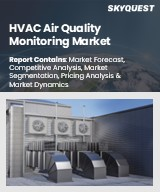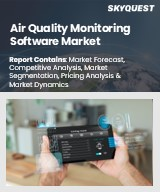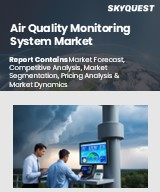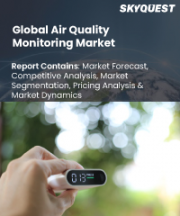
|
시장보고서
상품코드
1636127
중동 및 아프리카의 공기질 모니터링 시장 : 점유율 분석, 산업 동향, 성장 예측(2025-2030년)MEA Air Quality Monitoring - Market Share Analysis, Industry Trends & Statistics, Growth Forecasts (2025 - 2030) |
||||||
중동 및 아프리카의 공기질 모니터링 시장은 예측 기간 동안 3.5%가 넘는 CAGR을 나타낼 것으로 예상됩니다.

중기적으로는 산업화와 도시화의 진전이 대기질의 악화로 이어지고, 특히 개발도상국에서의 공기질 모니터링과 정화 수요를 촉진하고 있습니다.
한편 정부의 넷제로 카본 배출시책을 지원하기 위한 재생 가능하고 친환경적인 에너지의 보급은 예측기간 중 시장의 방해가 될 것으로 예상됩니다.
공기질 모니터링 시스템의 기술적 진보는 장비와 그 용도의 기술 개발에 큰 기회를 제공합니다.
사우디아라비아는 1차 에너지 소비량의 대부분을 차지하고 있기 때문에 중동 및 아프리카의 공기질 모니터링 시장을 독점할 것으로 예상됩니다.
중동 및 아프리카의 공기질 모니터링 시장 동향
옥외 모니터 부문이 가장 급성장할 전망
실외 공기 품질 모니터링 시스템은 오염물질, 부유입자, 습도, 외기온도 농도 수준을 측정합니다.
차드의 2021년 평균 PM2.5 농도는 75.9 마이크로그램/입방미터(μg/m3)로 세계에서 가장 오염된 국가 중 하나가 되었습니다. 이것은 아랍에미리트(UAE)의 평균 PM2.5 농도보다 40μg/m3 가까이 높습니다.
공기질 모니터링 시스템은 주로 정부가 특정 주와 국가의 도시와 공공 장소에 배치합니다. 이러한 장비는 내후성이 있으며 건축물 인증을 받으려면 특정 환경 검사 및 시뮬레이션을 충족해야 합니다.
옥외 모니터는 또한 휴대용 옥외 모니터, 고정식 옥외 모니터, 분진·미립자 모니터, AQM 스테이션으로 구분됩니다. 휴대용 옥외 모니터는 운영상의 이점과 쉬운 배포를 통해 세계적으로 가장 널리 배포됩니다.
도시화가 진행됨에 따라 도시 지역으로 옮겨가는 사람들이 늘어남에 따라 도시 지역의 대기 오염 수준이 상승하고 있습니다. 2050년까지 도시 지역에 사는 사람들은 25억명 증가할 것으로 추정됩니다. 인구밀도가 높고 산업시설, 도시폐기물 발생, 교통혼잡 등 다양한 오염원이 존재하기 때문에 공기질 모니터링과 대처 시스템의 개선이 강하게 요구되고 있습니다.
2023년 5월, 아랍에미리트(UAE) 기후 변화·환경부(MOCCAE)는 지역사회의 건강과 복지를 촉진하는 '지속가능년' 이니셔티브의 일환으로 64개 공기질 모니터링 스테이션의 분류를 업데이트 했습니다. 2022년에 발행된 동성의 지령에 의하면, 이 재분류는 최고의 환경·기후보호 기준을 유지하기 위해 필수였습니다.
따라서 이러한 신흥국 시장의 개척은 예측 기간 동안 옥외 모니터 시장을 견인할 것으로 기대됩니다.
사우디아라비아가 시장을 독점
사우디아라비아는 중동 및 아프리카에서 석유 및 가스의 생산과 소비의 대부분을 차지하고 있으며, 특히 산업화의 진전에 따라 화학 오염 물질이 증가하고 예측 기간 동안 공기질 모니터링 시장을 견인하고 있습니다.
또한 발전 부문은 대기 질 모니터링 시스템의 가장 큰 소비자입니다.
2021년 사우디아라비아는 중동 전체의 1차 에너지 소비량의 28.6%를 차지하고, 10.82 엑사줄이었습니다.
중동의 모니터 수는 2021년에 86% 증가했는데, 이는 주로 사우디아라비아와 이스라엘의 모니터 수가 크게 증가했기 때문에 그 모니터 수는 중동 전체의 73%를 차지했습니다.
따라서 위의 관점에서 사우디아라비아는 예측 기간 동안 큰 성장을 이룰 것으로 예상됩니다.
중동 및 아프리카의 공기질 모니터링 산업 개요
중동 및 아프리카의 공기질 모니터링 시장은 세분화되어 있습니다.
기타 혜택
- 엑셀 형식 시장 예측(ME) 시트
- 3개월간의 애널리스트 서포트
목차
제1장 서론
- 조사 범위
- 시장의 정의
- 조사의 전제
제2장 주요 요약
제3장 조사 방법
제4장 시장 개요
- 소개
- 2028년까지 시장 규모와 수요 예측(단위: 10억 달러)
- 최근 동향과 개발
- 정부의 규제와 시책
- 시장 역학
- 성장 촉진요인
- 억제요인
- 공급망 분석
- Porter's Five Forces 분석
- 공급기업의 협상력
- 소비자의 협상력
- 신규 진입업자의 위협
- 대체품의 위협
- 경쟁 기업간 경쟁 관계의 강도
제5장 시장 세분화
- 제품 유형
- 실내 모니터
- 옥외 모니터
- 샘플링 방식
- 연속
- 수동
- 간헐적
- 오염물질 유형
- 화학오염물질
- 물리적 오염물질
- 생물 오염물질
- 최종 사용자
- 주택과 상업시설
- 발전
- 석유화학
- 기타
- 지역
- 사우디아라비아
- 아랍에미리트(UAE)
- 기타 중동 및 아프리카
제6장 경쟁 구도
- M&A, 합작사업, 제휴, 협정
- 주요 기업의 전략
- 기업 프로파일
- Siemens AG
- Thermo Fisher Scientific Inc.
- Horiba Ltd
- Emerson Electric Co.
- Honeywell International Inc.
- 3M Co.
- Teledyne Technologies Inc.
- TSI Inc.
- Agilent Technologies Inc.
제7장 시장 기회와 앞으로의 동향
JHS 25.01.31The MEA Air Quality Monitoring Market is expected to register a CAGR of greater than 3.5% during the forecast period.
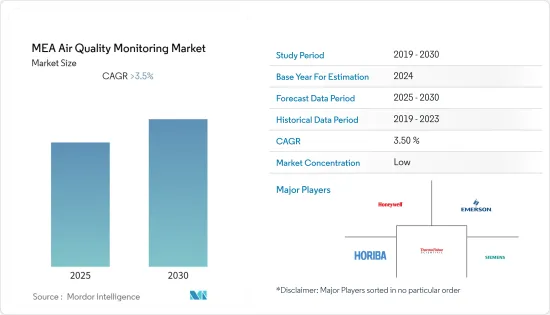
Over the medium period, increasing industrialization and urbanization are leading to a deterioration in air quality, driving the demand for air quality monitoring and purification, especially in developing countries.
On the other hand, the penetration of renewable and greener energy to support the government's net zero carbon emission policy is expected to hinder the market in the forecast period.
The technological advancements in air quality monitoring systems create enormous opportunities for the techno-development of devices and their applications.
Saudi Arabia is expected to dominate the Middle East and Africa Air Quality Monitoring market as the country holds the majority share in primary energy consumption.
MEA Air Quality Monitoring Market Trends
The Outdoor Monitor Segment is Expected to be the Fastest growing Segment
The outdoor air quality monitoring systems measure the concentration levels of pollutants, suspended particles, humidity, and temperature outside air, i.e., in open spaces. They detect the levels of pollutants like CO2, O3, NO2, SO2, formaldehyde (HCHO), total volatile organic compounds (TVOC), etc.
Chad had an average PM2.5 concentration of 75.9 micrograms per cubic meter of air (µg/m3) in 2021, making it one of the most polluted countries in the world. This was almost 40 µg/m3 more than the average PM2.5 concentrations in the United Arab Emirates.
Air quality monitoring systems are majorly deployed by governments in cities and public spaces of a particular state or country. These devices are weather-resistant and must meet certain environmental tests and simulations to be confided by some building certifications.
The outdoor monitors are further segmented into portable outdoor monitors, fixed outdoor monitors, dust and particulate monitors, and AQM stations. Portable outdoor monitors are the most widely deployed globally due to their operational advantage and easy deployment.
With the increasing urbanization and more people moving to urban areas, the air pollution levels in urban areas have increased. It is estimated that by 2050, 2.5 billion more people will live in urban areas. The high population density and diverse pollution sources like industrial facilities, municipal waste generation, and transport congestion lead to an urge for better air quality monitoring and address systems.
In May 2023, The United Arab Emirates' Ministry of Climate Change and Environment (MOCCAE) updated the classification of 64 air quality monitoring stations as part of the Year of Sustainability initiative to promote community health and welfare. According to the ministry's directive issued in 2022, this reclassification was mandatory to maintain the highest environmental and climate protection standards.
Therefore, such developments are expected to give a thrust to the outdoor monitor segment of the market during the forecast period.
Saudi Arabia to dominate the market.
Saudi Arabia has the majority of the production and consumption of oil and gas in the Middle East and Africa region, particularly due to growing industrialization, which has increased chemical pollutants, thereby driving the air quality monitoring market in the forecast period.
Moreover, the power generation sector is the biggest consumer of air quality monitoring systems. The power production sector is increasingly switching from coal-fired power plants to gas-fired power plants and renewable power generation due to the problems associated with climate change.
In 2021, Saudi Arabia accounted for 28.6% of the total primary energy consumed across the Middle East, with 10.82 exajoules. Fossil fuels, such as oil, natural gas, and coal, accounted for a significant share of the total primary energy consumed in the region in 2021.
The number of monitors in the Middle East region climbed by 86% in 2021, mostly due to a significant increase in the number of monitors in Saudi Arabia and Israel, whose monitors comprised 73% of all in the region.
Therefore, owing to the above points, Saudi Arabia is expected to witness significant growth during the forecast period.
MEA Air Quality Monitoring Industry Overview
The Middle East and Africa Air Quality Monitoring Market is fragmented. Some of the major players (not in the particular order) include Siemens AG, Thermo Fisher Scientific Inc., Horiba Ltd, Emerson Electric Co., and Honeywell International Inc., among others.
Additional Benefits:
- The market estimate (ME) sheet in Excel format
- 3 months of analyst support
TABLE OF CONTENTS
1 INTRODUCTION
- 1.1 Scope of the Study
- 1.2 Market Definition
- 1.3 Study Assumptions
2 EXECUTIVE SUMMARY
3 RESEARCH METHODOLOGY
4 MARKET OVERVIEW
- 4.1 Introduction
- 4.2 Market Size and Demand Forecast in USD billion, till 2028
- 4.3 Recent Trends and Developments
- 4.4 Government Policies and Regulations
- 4.5 Market Dynamics
- 4.5.1 Drivers
- 4.5.2 Restraints
- 4.6 Supply Chain Analysis
- 4.7 Porter's Five Forces Analysis
- 4.7.1 Bargaining Power of Suppliers
- 4.7.2 Bargaining Power of Consumers
- 4.7.3 Threat of New Entrants
- 4.7.4 Threat of Substitute Products and Services
- 4.7.5 Intensity of Competitive Rivalry
5 MARKET SEGMENTATION
- 5.1 Product Type
- 5.1.1 Indoor Monitor
- 5.1.2 Outdoor Monitor
- 5.2 Sampling Method
- 5.2.1 Continuous
- 5.2.2 Manual
- 5.2.3 Intermittent
- 5.3 Pollutant Type
- 5.3.1 Chemical Pollutants
- 5.3.2 Physical Pollutants
- 5.3.3 Biological Pollutants
- 5.4 End User
- 5.4.1 Residential and Commercial
- 5.4.2 Power Generation
- 5.4.3 Petrochemicals
- 5.4.4 Other End Users
- 5.5 Geography
- 5.5.1 Saudi Arabia
- 5.5.2 United Arab Emirates
- 5.5.3 Rest of Middle-East and Africa
6 COMPETITIVE LANDSCAPE
- 6.1 Mergers and Acquisitions, Joint Ventures, Collaborations, and Agreements
- 6.2 Strategies Adopted by Leading Players
- 6.3 Company Profiles
- 6.3.1 Siemens AG
- 6.3.2 Thermo Fisher Scientific Inc.
- 6.3.3 Horiba Ltd
- 6.3.4 Emerson Electric Co.
- 6.3.5 Honeywell International Inc.
- 6.3.6 3M Co.
- 6.3.7 Teledyne Technologies Inc.
- 6.3.8 TSI Inc.
- 6.3.9 Agilent Technologies Inc.






